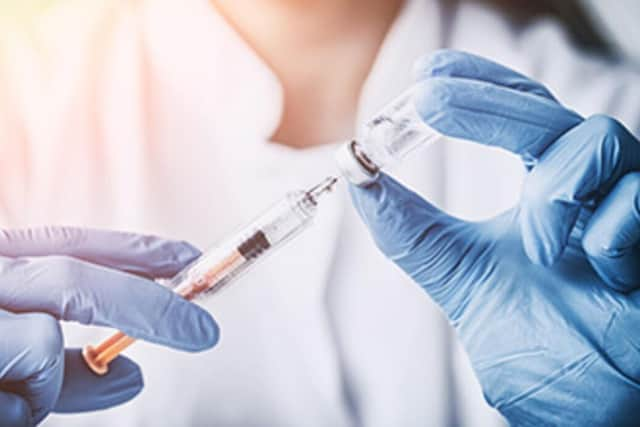World Immunisation Week emphasises importance of vaccination in fight against many forms of illness
and live on Freeview channel 276
The ultimate goal of World Immunisation Week is for more people and their communities to be protected from vaccine-preventable diseases.
The Public Health Agency (PHA) is therefore using this week to remind the public that in Northern Ireland everyone at some point in their lifetime will be eligible for free vaccination.
Advertisement
Hide AdAdvertisement
Hide AdWorld Immunisation Week is celebrated April 24-30, and aims to highlight the collective action needed to improve uptake and to promote the use of vaccines to protect people of all ages against disease.


Louise Flanagan, consultant in public health at the PHA, said: “Getting vaccinated is the single most important thing we can do to protect our health.
"Vaccination starts before birth with pregnant women being offered vaccines to protect them and their unborn babies and continues after the baby is born though their pre-school years, teenage years and then as an older adult.”
Immunisation is the safest and most effective way of protecting against serious diseases.
Advertisement
Hide AdAdvertisement
Hide AdMany childhood diseases that were common in the UK prior to the introduction of vaccination have been dramatically reduced or have disappeared altogether.
Unfortunately, unless vaccine uptake remains high in Northern Ireland, many deadly diseases will return from parts of the world where they still occur.
Ms Flanagan continued: “The PHA strongly recommends that babies and children are vaccinated according to the Routine Childhood Immunisations Schedule.
"Vaccination rates have seen a slight decrease over recent years and the additional disruption caused by the pandemic is likely to have caused some of the decreases in vaccine coverage.
Advertisement
Hide AdAdvertisement
Hide Ad"It is important vaccination coverage is improved as soon as possible to help prevent the spread of avoidable serious and sometimes deadly diseases such as measles and polio.
“If you are unsure if your child is up to date with vaccinations, the easiest way to check is to look at your child’s red book or speak to your health visitor or GP. "
In recent years new vaccines have been included to offer further protection against a range of other illnesses of both childhood and older years, such as rotavirus for babies, pertussis for pregnant woman, shingles for 70 year olds, and HPV for school children in year 9 and 10.
Ms Flanagan added: “Like all vaccines that are offered on the immunisation programme, these have been proven to be both safe and effective, and are saving and improving lives.
Advertisement
Hide AdAdvertisement
Hide Ad“It is only when people continue to get their children and themselves vaccinated in large numbers that we can prevent these diseases, and the possible deaths, so it is vitally important that we don’t take our health and that of our children for granted.
“After clean water, vaccination is the most effective public health intervention in the world for saving lives and promoting good health, and therefore one of the most important things that any parent can do is get their child vaccinated and encourage them to continue this throughout their own lifetime.”
For more information click here.